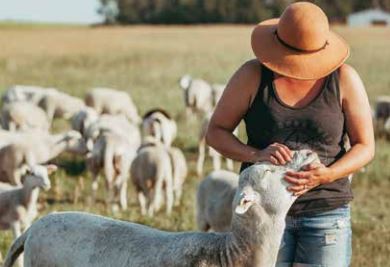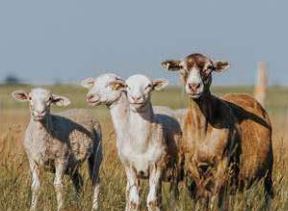Do you know where your food comes from?

operate Farm 140, about a 15-minute drive
southwest of Saskatoon. (Photo: Janelle Wallace)
It’s a question Arlie LaRoche loves answering and she’s excited that more people in Saskatoon are asking it.
“I guess I always took that for granted because I grew up on a farm, and I always knew where my food was coming from,” LaRoche said.
LaRoche and her family own and operate Farm 140, a holistically managed farm of 140 acres about a 15-minute drive southwest of Saskatoon. As Farm 140’s website states, it is “a local, sustainable and natural choice for Saskatoon’s ethical eaters.”
The cows, pigs, sheep and chickens that call Farm 140 home are cared for as if they were in the wild, with an added dose of love and kindness from LaRoche.
LaRoche saw how conventional methods of farming, whether it was grain or cattle, had a detrimental impact on the environment and the animals themselves. She wanted to do something different with Farm 140.
As LaRoche walks amongst her sheep, their heads down eating a mixture of green grass and weeds, she explains how she practices holistic farming with her animals.
Her 140 acres are divided into 12 paddocks, each around three or four acres in size. The sheep currently in this paddock will stay there for three or four days. They will eat up all the grass and weeds in the paddock and then replenish the soil through their poop.

farming with her animals.
(Photo: Janelle Wallace)
Then LaRoche moves the herd, along with food and water stations, shading devices (important for pigs) and the actual fence itself, to a new paddock to do it all over again. Each paddock is given a 21-day break before any type of animal sets foot, or hoof, on it again.
“We look at our farm as a whole. It’s not just a chicken or a pig or a grain farm. It’s everything all rolled into one. So when we make a decision about one thing, we have to consider how it will impact x, y and z,” said LaRoche.
Every spring, LaRoche makes a detailed grazing plan, using a spreadsheet, to map out where her animals will be. Why does she choose to do it this way? She rolls her eyes a bit and then laughs when delivering the answer.
“It felt like the right thing to do. I know that’s a silly answer, but I just never considered doing it any other way. I have seen the effects of the conventional model and I wasn’t OK with it. I wanted to do better.”
It’s important to note that she holds no ill will or animosity towards the conventional, and she is hyperaware about coming off as preachy when it comes to her holistic methods. LaRoche simply wants to educate people about her methods and allow them the chance to make an informed decision about where their food comes from.
“It’s something important for humans to remember—and it’s part of my goal in trying to reconnect people to their food—is that when you have that chicken breast or lamb chop for supper, that was an animal. You shouldn’t forget that and you shouldn’t take that for granted. It should be special, because it is a sacrifice.”

Arlie LaRoche makes a
detailed grazing plan to map
out where her animals will
be. (Photo: Janelle Wallace)
LaRoche loves her animals. She can look out at her sheep and point out which ones were born in the last few years and which have been by her side for years. She even has names for a few of them.
LaRoche and her husband, Brett, have two young children. Work-life balance is a constant struggle, and LaRoche is honest in saying she spends more time with her animals than her children.
That makes the day when she has to say goodbye to her animals a difficult one.
“It’s a complicated relationship between a farmer and their animals because I’m with these guys all the time. I don’t see humans every day like an office worker would. I see these guys every day.”
LaRoche leans on her family for support on those challenging days, but she is passionate in her belief in the importance of educating people about where their food comes from.
It’s why she and her husband opened Odla, a farm-to-table restaurant, in Saskatoon’s Broadway neighbourhood this past summer, serving Farm 140 meat and vegetables. It’s why she tours school groups around her farm and answers all types of questions from the kids. It’s why she hosts large groups of curious city folks for large summer meals under nighttime prairie skies. She wants people to know the answer to that question.
“I think it’s really sad when people don’t know where their food is coming from. I think that’s such a basic human need. To not know where that human need, that you need every single day of your life, is coming from. . . . I just think that’s kind of heartbreaking.”
(Eric Anderson is the host of YXE Underground, a local, independent podcast that shares stories of people who are making a difference in Saskatoon but who are flying under the radar. You can subscribe, for free, to YXE Underground on Apple Podcasts or through your favourite podcast app. You can also stream episodes on Spotify or at www.yxeunderground.com. Anderson worked as a journalist for CBC Radio in Saskatchewan for eight years and is currently the communications leader at Sherbrooke Community Centre.)
-Eric Anderson
